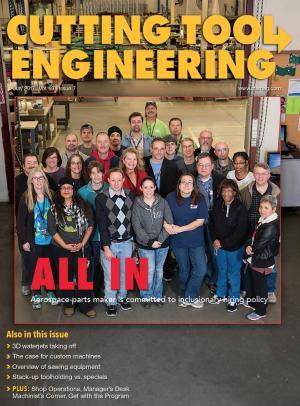Skills Inc. is a unique nonprofit manufacturing company that serves the aerospace industry and is dedicated to helping people with disabilities thrive in today’s manufacturing environment.
The Auburn, Wash., company describes itself with a one-two-three mnemonic: one mission (creating a stable, rewarding workplace for people with disabilities), two bottom lines (financial and social) and three paths to achieving its goals (employing people with disabilities, offering vocational assessment and training, and serving as a role model and resource for diversity to employers in the community).
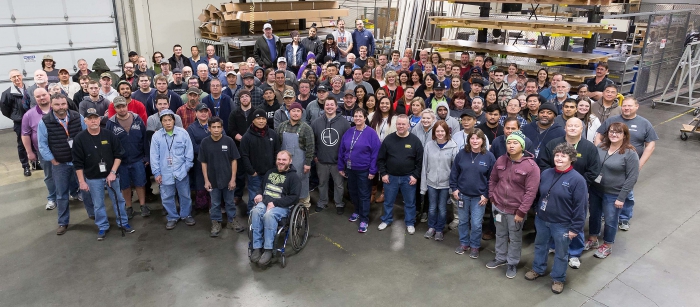
By design, 60 percent of Skills’ employees have a self-identified disability. All images courtesy of Skills.
Skills Inc. is a 501(c)(3) nonprofit corporation. It is entirely self-funded by its lines of business, primarily machining and fabricating aerospace parts. Started in 1966 with a $4,500 grant from The Boeing Employee Good Neighbor Fund, Skills Inc.’s 2016 revenues exceeded $59 million, and it produced 3.5 million components.
One in five Americans has a disability. Sixty percent of Skills’ employees have a self-identified disability. Skills operates as a role model for inclusion and disability employment where persons with and without disabilities work together in all areas of the organization.
Ability and Attitude
“Providing employment opportunities to individuals with disabilities has given us the opportunity to think deeply about how to design a work environment that allows all employees, including those with disabilities, to be successful,” said Skills Inc. CEO Todd Dunnington.
 Todd Dunnington is CEO of Skills. |
Skills employs people with a variety of disabilities, whether physical, medical, sensory (sight, hearing), emotional (depression, anxiety) or learning, Dunnington added.
Skills serves as a resource for members of the community who may experience significant barriers to employment. Dunnington said the company hires people for their abilities—not their disabilities.
“We have a strong emphasis on job fit, and we maintain high expectations for all employees,” he said. “We provide accommodations, when requested, that are typically low cost and easily maintained.”
For example, to support the communication needs of deaf employees, the company keeps American Sign Language interpreters on staff. It also uses assistive technology, so an employee at a work station can communicate with anyone in the nation via a webcam and an ASL interpretation network that’s available to all employers.
“Most importantly, we hire people for their attitude,” Dunnington said. “An inclusive work environment attracts employees who want to work hard and enjoy working in an atmosphere where teamwork and co-worker support is the norm.”
One of the many pipelines the company maintains to supply new employees is the Skills Inc. Aerospace Internship Program. AIP is offered to special-education students from local high schools who may be struggling in the classroom. Most have learning disabilities, and some also have physical disabilities.
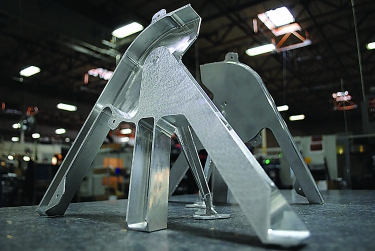
CNC machinesallow Skills to bid on jobs for increasingly complex aerospace parts.
According to Dunnington, AIP hosted 33 students this year who came to Skills each morning to receive classroom and shop-floor training while also earning credits towards graduation. At the same time, they learned applied math and other academic subjects, as well as valuable life skills such as being on time, following directions and communicating with supervisors and co-workers.
“We’re proud of the program, because if you can help somebody early in their life, the benefits last for decades,” he said.
Solutions to Challenges
Not content merely to provide valuable vocational services to the local community, Skills doubles as a world-class supplier of machined components and fabricated sheet-metal parts for the aerospace industry, for both commercial and defense supply chains. Its manufacturing capabilities range from fabricating and machining single components to producing complex assemblies, while meeting stringent quality standards, including ISO 9001/AS9100 certification and DPD/MBD (Digital-Product Definition/Model-Based Definition) verification.
The company prides itself on continuously improving its processes and technology—finding solutions to even the toughest machining challenges while staying true to its social mission.
“All our manufacturing processes are standardized and error-proofed. These standardizations allow our employees to be successful with great outcomes,” said Dan Olson, Skills Inc. plant manager of manufacturing.
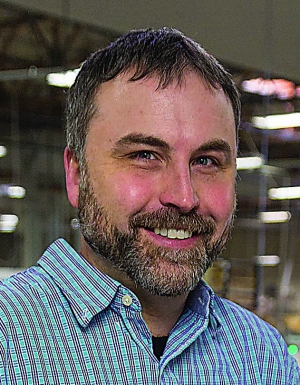 Dan Olson is Skills’ plant manager of manufacturing. |
As an example, Olson said all of its machines have the same type of controls, all tool magazines have the same standard set of tools in the same positions, and all cutting tools are held in Haimer shrink-fit toolholders.
Another example of standardization is the setup documentation. “Everyone learns in different ways. We try to capitalize on each individual’s abilities,” Olson said. “Our setup books are robust, with standard formats, visuals of the part at each step and written instructions.”
Olson is overseeing a plantwide switch from standard edge finders and dial indicators to Renishaw probes, with an automated presetter for offsetting tool height. The system also allows Skills to quickly set machine coordinates and complete first-part verification on the machines, saving both machine and operator time.
These efforts to simplify and standardize procedures and adopt best practices aren’t unique to Skills, but they are essential for meeting the company’s goal of moving more employees successfully into operator positions. At the same time, these practices improve the bottom line by reducing cycle time, machining operations, manual rework and scrapped parts. “We constantly talk about it and work at it,” Olson said.
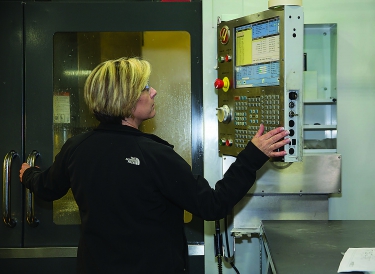
CNC machinist Shari Erickson marvels at the attentive and supportive attitude that supervisors bring to training employees. “They look at what people can do and what they’re good at,” she said. “And they build on that.”
The dual focus of Skills results in many areas of positive overlap and reinforcement between its social and business goals. Thus, the whole is truly greater than the sum of its parts.
The company has high expectations for each employee, while offering individualized training and assistance to help each person meet those expectations. Standardizing processes that incorporate the latest technology and equipment to enhance efficiency and repeatability for employees with disabilities also makes it possible for them to produce high-quality products at a low cost.
“We prove that focusing on abilities—what people can do—creates an environment where success not only becomes possible, it becomes a competitive advantage,” Dunnington said.
For more information about Skills Inc., call (206) 782-6000 or visit www.skillsinc.com.
Related Glossary Terms
- computer numerical control ( CNC)
computer numerical control ( CNC)
Microprocessor-based controller dedicated to a machine tool that permits the creation or modification of parts. Programmed numerical control activates the machine’s servos and spindle drives and controls the various machining operations. See DNC, direct numerical control; NC, numerical control.


